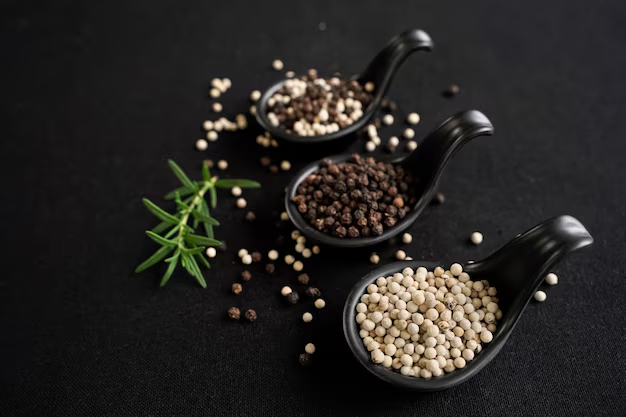White pepper vs black pepper: Is there a difference, and how do you choose the right one?

Choose black pepper when you want a strong punch of flavour and aroma, and choose white pepper when you need subtle heat, a cleaner look, or a smooth finish.
Pepper is one of the most commonly used spices in kitchens worldwide; it is a staple on dining tables and in recipes ranging from the simplest dishes to the most refined. Yet many home cooks are unaware that not all peppers are the same.
The choice between white pepper and black pepper is not merely aesthetic; there are real differences in flavour, aroma, and best use.
Both peppers come from the same plant called Piper nigrum, but their production diverges after harvesting.
Black pepper is made from unripe peppercorns that are briefly cooked and then sun-dried, which gives them their dark, crinkled appearance and bold, pungent taste. It is known for adding warmth, depth, and a faint fruitiness, making it suitable for just about everything: soups, sauces, grilled meats, vegetables, and eggs.
White pepper, by contrast, is made from fully ripened peppercorns from which the outer skin has been removed. This now results in a smoother, paler peppercorn with a subtler, earthier heat and a slightly fermented note.
It is particularly popular in Chinese and French cooking, where chefs often prefer it when flavour is needed, but visible black specks are not.
“You’ll find white pepper in mashed potatoes, cream-based sauces, and pale soups,” says one Nairobi-based chef. “It gives you the heat without interrupting the colour or presentation of the dish.”
White pepper is also a key ingredient in certain spice blends, such as Chinese five-spice, and is often used in Asian stir-fries, where its gentler profile complements rather than dominates.
Black pepper, meanwhile, remains an undisputed everyday choice.
When freshly cracked, it becomes so aromatic and complex, far more so than pre-ground pepper and adds an instant lift to most savoury dishes.
So is one better? Not at all, but they are definitely not identical.
Choose black pepper when you want a strong punch of flavour and aroma, and choose white pepper when you need subtle heat, a cleaner look, or a smooth finish.
Ultimately, the secret lies not in picking the “best” pepper, but in understanding what each brings to the kitchen.
Top Stories Today














































